Hundreds leaped out of their seats as former speaker of the House, Rep. Nancy Pelosi, entered the First Parish Church in Cambridge for an intimate conversation on politics, the future of democracy, and unity.┬Ā
Pelosi appeared alongside Massachusetts Gov. Maura Healey for a panel discussion organized by Harvard Book Store to promote PelosiŌĆÖs new book ŌĆ£The Art of PowerŌĆØ on Wednesday.
The event was delayed by over 20 minutes, as the sold-out crowd of 600 stretched down the block waiting to enter.┬Ā
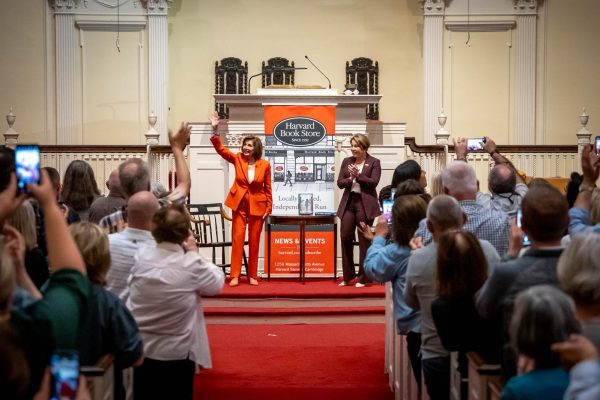
In the streets surrounding the event, separated by police barricades, were roughly three dozen pro-Palestinian protesters. The protesters came from various pro-Palestine organizations, including Somerville for Palestine and Massachusetts Peace Action.┬Ā
Multiple Cambridge police officers stood by the exterior doors to the venue, which were locked after the event began.
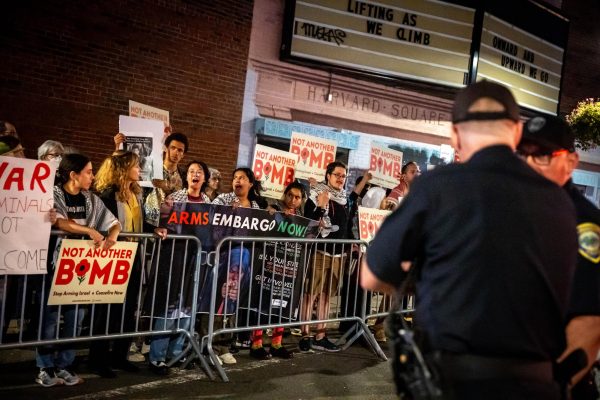
In two separate instances throughout the talk, pro-Palestinian protesters in the audience interrupted to yell at Pelosi, calling for an arms embargo on Israel.┬Ā
Protesters draped a banner over the balcony of the second floor reading ŌĆ£Arms Embargo Now,ŌĆØ before being swiftly escorted out by security.
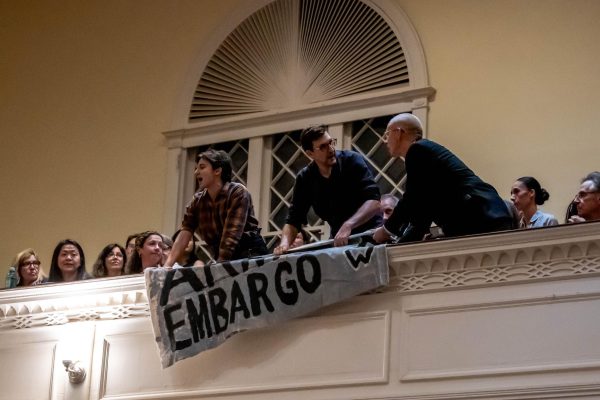
One audience member stood up and yelled at Pelosi.
ŌĆ£Speaker Pelosi, thank you for speaking out on Gaza,ŌĆØ the protester yelled as some audience members clapped and others booed. ŌĆ£How are you going to use the ŌĆśArt of PowerŌĆÖ to stop the bombs,ŌĆØ they said before continuing to yell ŌĆ£Stop the Bombs. Stop the Killing.ŌĆØ
The crowd shushed and booed the protester as Healey attempted to pivot to discuss PelosiŌĆÖs greatest accomplishment. The protester was later removed.┬Ā
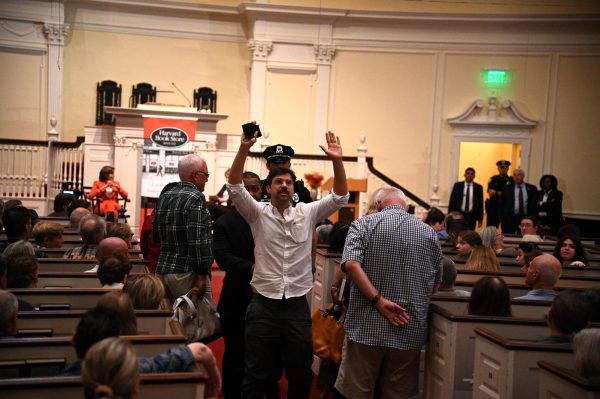
Harvard Book StoreŌĆÖs policy for the event was to remove individuals who maintained a ŌĆ£continued disruption,ŌĆØ Cassie Davis, the director of events for Harvard Book Store, told The Beacon.
Pelosi praised President Joe BidenŌĆÖs policy in the Middle East.
ŌĆ£He has been spectacular in so many respects ŌĆ” and he has been a friend of Israel as we all have ŌĆ” but he also has been very concerned about a two-state solution for the region ŌĆ” [and] a strong supporter of humanitarian assistance for the people of Gaza,ŌĆØ Pelosi said.
Pelosi then directly addressed the pro-Palestine protesters.
ŌĆ£I say to them, ŌĆśOne day, would you say something about the hostages?ŌĆÖ No. They’re just on a thing about Joe Biden, which makes me question,ŌĆØ Pelosi said. ŌĆ£I know that many of them are sincere. But not all of it. A lot of it has a political purpose against Joe Biden, and now they’re transferring that to Kamala Harris.ŌĆØ
Chris, an Emerson alumni and protester with Somerville for Palestine, who was outside the event, said, ŌĆ£As one of the Democratic members of Congress, [Pelosi] hasn’t really pushed back against Biden’s supplication of weapons and diplomatic cover to Israel’s ongoing campaign of genocide and ethnic cleansing against the Palestinians.ŌĆØ
After attendees took their seats and were given books, Davis introduced Pelosi and Healey.
She praised PelosiŌĆÖs political work as the first female speaker in United States history, and her involvement in legislation like the Affordable Care Act and investigations of the Jan. 6 insurrection, both subjects which took central focus in the panel discussion.
ŌĆ£For those of us awed by her political morals, it is confirmation that no modern figure has practiced the art of power so effectively,ŌĆØ Davis said.
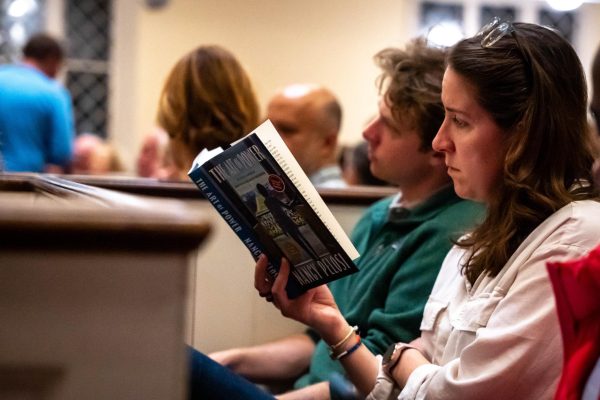
ŌĆ£The Art of PowerŌĆØ focuses on PelosiŌĆÖs achievements and detailed memories of her time working within the CapitolŌĆÖs walls. In her talk, Pelosi connected her stories to the presidential election in a couple of weeks.┬Ā
She referred to the Affordable Care Act, in which she persuaded Republicans to vote for an ambitious liberal legislation. ŌĆ£It was hard, but it was about respect,ŌĆØ Pelosi said. ŌĆ£We pushed open the gates because we had the courage of our members.ŌĆØ┬Ā
Pelosi added that the legislation was only possible because of outside mobilization of supporters. Criticizing identity politics, she said that she could pass controversial bills because she could appeal to legislators by emphasizing, ŌĆ£It wasnŌĆÖt about another agenda, it was about the purpose of the bill.ŌĆØ┬Ā
While she used the Affordable Care Act as an example of bipartisan cooperation, she warned the audience of the dangers if the cooperation ends.┬Ā
ŌĆ£The Art of PowerŌĆØ also reveals detailed accounts of the Jan. 6 insurrection from PelosiŌĆÖs perspective.┬Ā
ŌĆ£It was something so historic,ŌĆØ she said, ŌĆ£so terrible, and now misrepresented by revisionist history as a ŌĆśday of love.ŌĆÖŌĆØ┬Ā
Pelosi was referring to former President Donald Trump, whose continuous attempts to portray the Jan. 6 attackŌĆöin which hundreds of his supporters stormed the Capitol and assaulted officersŌĆöas a ŌĆ£day of love.ŌĆØ┬Ā┬Ā
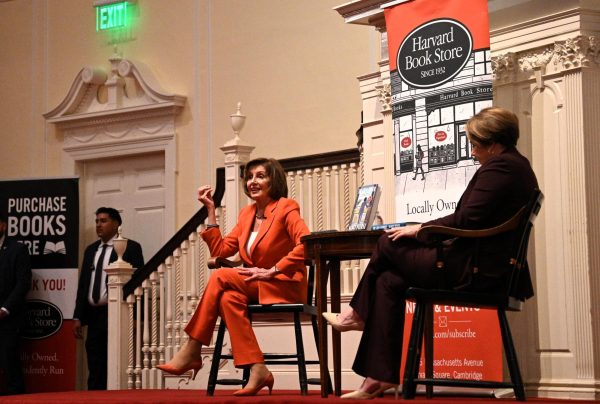
ŌĆ£The trauma that occurred because of it, on members, on staff, the press, or anybody that happened to be there was horrible,ŌĆØ Pelosi said.┬Ā
ŌĆ£I will never forgive them for causing the trauma of my own staff, under tables, behind locked doors with furniture pushed up for hours, not being able to talk in the dark, scared for days,ŌĆØ she added.┬Ā
Looking to the upcoming house elections, Pelosi said that it is ŌĆ£absolutely essentialŌĆØ that the Democrats win the majority in the House and install Hakeem Jeffries as speaker, to ensure ŌĆ£decorumŌĆØ and the certification of the electoral college going forward.
Pelosi, who joked that she did not ŌĆ£want to talk politics in church,ŌĆØ continued to use the panel to criticize Trump and motivate listeners to help get Harris elected.
She mentioned multiple cases in which Republicans collaborated with Democrats.┬Ā
ŌĆ£The country needs a strong Republican Party, not a cult,ŌĆØ she said.┬Ā
Pelosi, who at many times in her career shared she was the only woman in the room, also expressed a call for more women to pursue politics.
ŌĆ£When women succeed, America succeeds,ŌĆØ Pelosi said. ŌĆ£The other thing, in my experience, is we have better policies.ŌĆØ
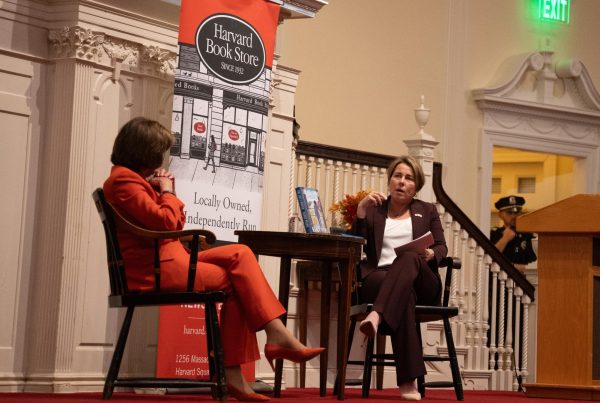
Among the attendees were some figures in the Massachusetts legislature, most notably retired Rep. Barney Frank, who collaborated with Pelosi on hate crime legislation under the Obama administration.┬Ā
Also present was Rep. Marjorie Decker (D-25th Middlesex), who said PelosiŌĆÖs theme of the talk was unity.┬Ā
ŌĆ£She talked about Republicans that arenŌĆÖt necessarily embracing Harris, but understand that their vote for Harris is embracing democracy,ŌĆØ Decker told The Beacon.
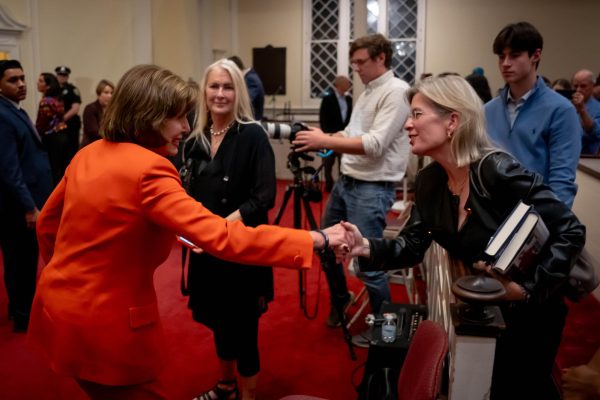
ŌĆ£The main thing I think that Nancy Pelosi wanted us to take away from the conversation is people should vote on Tuesday. And there’s no question about how she wanted them to vote,ŌĆØ Jeff Mayersohn, the owner of Harvard Book Store, said in an interview with The Beacon.┬Ā
With less than two weeks to Election Day, Pelosi urged supporters to get involved with getting-out-the-vote initiatives.
ŌĆ£The mobilization is in your hands,ŌĆØ she said. ŌĆ£People say [to me] ŌĆśI have my fingers crossed,ŌĆÖ I say, ŌĆśUncross them and make some calls.ŌĆÖŌĆØ
She concluded her remarks with another rallying cry for the upcoming election.
ŌĆ£We have to just win, baby. Just win the election,ŌĆØ Pelosi said. ŌĆ£People have said I’m the most significant woman in politics in our country’s history. In 12 days, that will no longer be true.ŌĆØ